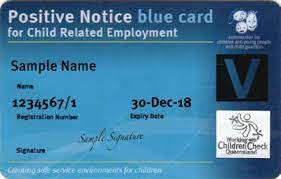
There have been many questions asked regarding the Queensland Blue Card system (Child protection certification) and what level of compliance is required by MAAQ Clubs particularly in relation to;
- Operations (Training, attendance, youth programs, etc.)
- Marketing / advertising (Creating material for youth or youth organisations)
This page is provided to MAAA affilated clubs in Queensland (through MAAQ) with clear information on;
- What is the Blue Card?
- What MAAQ have done to verify and validate our Blue Card status
- MAAQ Blue Card classification information
- What is the Frequency Test and how does it apply?
- What is a Blue Card event?
- Responsibility and liability of Blue Card holders
What is the Blue Card?
The Blue Card system is a Queensland Government system regulated under the Working with Children (Risk Management and Screening) Act 2000 (the Act) and is applicable to any business or organisation providing activities or services to under 18 years old (We will refer to them as Youth for the rest of this article).
How has the MAAQ verified their Blue Card position
The MAAQ Secretary, Rodney Clarke, who is already an owner of a business who uses the Blue Card business portal, and employs Blue Card holders, spent several days going through the Queensland Government Blue Card website as well as many phone calls to and from Senior Blue Card advisors to determine a clear and communicable position for MAAQ clubs.
The final position (below) was agreed between MAAQ and the QLD Government Blue Card senior advisers on the 15th March, 2023.
Classification Information on MAAQ Clubs
Specific background information in relation to MAAQ Clubs;
- MAAQ clubs are classified under the Churches, Clubs and Associations ruling.
- MAAQ clubs are not considered a regulated organisation under the Child Protection Act (The Senior Advisor confirmed our sport comes under the “Mixed age group” category, that is, even when a trainer is providing one on one training to a youth it is not an activity or service targeted specifically at youth and therefore not a Blue Card required occurrence (Blue Card event))
- Regardless of our clubs having members who are minors our clubs do not require to be registered as a Blue Card organisations as generally we are not;
- Specifically targeting services to children, eg., Learn to Fly School Holiday programs, or a ‘Junior Fly’ program, or;
- Fall short of the Blue Card Frequency Test (See Frequency Test below) for Blue Card events (Services or activities being provided to youth)
- (Also see below ‘What is considered a Blue Card Event‘ to ensure this still applies to your club)
Frequency Test
There is a Frequency Test of how often a club, or person, engages in services or activities being provided to children and that is 7 times per year (Blue Card event). The duration of each of those times is not specified, only the quantity. As soon as a club or person goes over 7 times they require a Blue Card.
The Frequency Test applies to either a club or an individual, that is, if a club holds 7 or less Blue Card events a year, eg. A ‘Junior Fly Day’, where they are engaging in providing services or activities to youth there is NO Blue Card requirement at all.
If the individual exceeds this frequency (perhaps with other volunteer work in other organisations) then it is up to that individual to have a Blue Card however that is the responsibility of the individual and not MAAQ nor the club.
If the Frequency Test is exceeded, what then?
If a club is going to provide services or activities to youth on more than 7 occurrences (See Blue Card Event below) in a calendar year then the following people in their organisation must have a Blue Card (as well as all of the other compliance requirements that go with it such as the creation and ongoing maintenance of a Child and Youth Risk Management Strategy);
- All committee members (regardless of whether they will be involved in the design, management or execution of the youth program)
- Any and all members involved in the running of the program, ie., trainers, coaches, etc.
Other club members are not required to hold a Blue Card if they are just general members doing their own thing on the day, or, if they are members who are responsible for designing the youth program.
What is considered a Blue Card event?
A Blue Card event which would contribute towards the frequency test (mentioned above), as an example, would be a club who;
- Runs a ‘Come and Try day’ specifically targeting youth (You could have a ‘Come and Try Day’ and not target youth and that’s ok, youth can still come but its not targeting youth)
- Holds an “Open day” but also;
- Creates a pamphlet targeting youth, ie., “Junior Open day”
- Creates a pamphlet not targeting youth but either;
- Stands outside of a school handing those pamphlets to youth, or;
- Is not in front of a school (so anywhere else) but hands the pamphlets to youth directly (You can hand the pamphlet to their parents if they are present but not directly to the youth)
Responsibility and Liability of Blue Card Holders
The next questions that come up are, “What is the Blue Card holders responsibility versus liability?”. I discussed this at length with Blue Card services and the outcome is expressed below as a Q&A;
- Q: Is there any specific responsibility of Blue Card Holders to take action if they see anything untoward?
- A: Under the Child Protection Act there is a responsibility on every person to never turn a blind eye to an offence as we are all responsible to act in the best interest of youth. As a Blue Card holder there are no additional obligations or responsibilities.
- Q: Is there any additional or specific liability of a Blue Card Holder, who for example, while present at the club, and does not witness any untoward behaviour while they were present, however something happened to a child;
- A: No.
Disclaimer
While the information provided above has been determined by extensive discussions with Blue Card Service and the MAAQ, it is the responsibility of each and every club to ascertain their position in regards to their compliance to the current Queensland Blue Card services guidelines.
